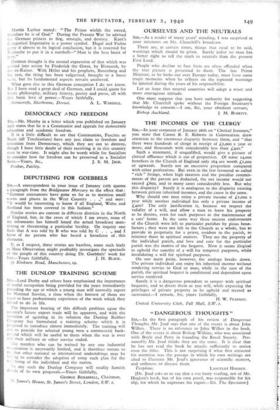THE INCOMES OF THE CLERGY
Snt,—In your comment of January 26th on "Clerical Incomes," you state that Canon R. E. Roberts in Convocation drew attention to the enormous disparity between them, and "that there were hundreds of clergy in receipt of Lia000 a year or more, and thousands with considerably less than £400."
Such a statement, if unqualified, would give a picture of clerical affluence which is out of proportion. Of some 14,oco benefices in the Church of England only 264 are worth £i,000 or upwards. Surely not an excessive proportion compared with other professions. But even in the few favoured so called " rich " livings, when high taxation and the peculiar commit- ments of the parson are deducted, the net income would not exceed £600, and in many cases considerably less. But why this disparity? Surely it is analogous to the disparity existing between private inherited incomes, and the cause is the same.
Why should one man enjoy a private income of Lx,000 a year while another individual has only a private income of ,C400? The only justification is, because we respect the validity of a will, and allow a man to leave his property as he desires, even for such purposes as the maintenance of a cats' home. In the same way these ancient endowments of the Church were left to particular parishes by pious bene- factors; they were not left to the Church as a whole, but to provide in perpetuity for a priest, resident in the parish, to minister there in spiritual matters. They are the property of the individual parish, and love and care for the particular parish was the motive of the bequest. Now it seems illogical to uphold the sanctity of a will for temporal purposes, while invalidating a will for spiritual purposes.
On one main point, however, the analogy breaks down. The private individual can enjoy his inherited income without rendering service to God or man, while in the case of the parish, the spiritual bequest is conditional and dependent upon service rendered.
Surely it is a dangerous precedent to tamper with spiritual bequests, and to divert them as you will, while expecting the privileges of private property to be upheld and treated as sacrosanct.—I remain, Sir, yours faithfully,






































 Previous page
Previous page